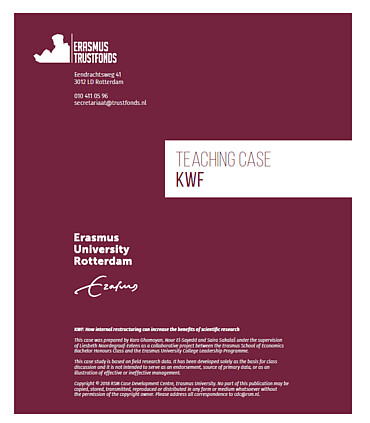Abstract
Our protagonist is Michel Rudolphie, the former CEO of the Dutch Cancer Society, KWF, in the Netherlands. He made decisions about internal restructuring of this NGO to be able to see its impact on the patient and speed up the time period patients need to receive benefits of laboratory research. Our approach is descriptive as the problem was already tackled (2011- 2017) and the solutions are known. The trigger for the change was ability to retrieve data in relation to patients’ well-being only from the last 6 out of 65 years of cancer researching funding. Seeing that KWF as a responsibility towards the society to perform and operate better, Mr. Rudolphie initiated the chain of events; reforming the organization from the inside was followed by changes in the communication with the external parties, research institutes. KWF aimed to facilitate translational research by taking a mediating role between the laboratories and the clinics, to achieve results quicker and closer to the patient. The main target was to use resources wisely by changing the funding criteria, creating programs for research collaboration, but most importantly, change the mentality of the workers and stakeholders.
Citation Note
Based on field research; 8 pages.
Follow the 'handle' link to access the Case Study on RePub.
For EUR staff members: the Teaching Note is available on request, you can contact us at rsm.nl/cdc/contact/
For external users: follow the link to purchase the Case Study and the Teaching Note.
Objective
1. Highlight the difficulty of measuring the impact of KWF and its funding to actually attain the change. 2. Understand and describe the necessary changes that are needed to move from fund & forget to commit & integrate: organisational culture (skills training, KPIs, ...), partnership with external organisations. 3. Understand the complexity of stakeholders’ management and organizational culture. 4. Create a better understanding of how transformational leadership can contribute to the change of organizational culture.
